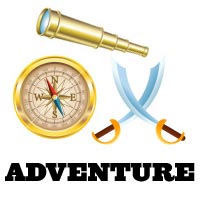|
Historically-Based Swashbucklers of the 1950s:
Errol Flynn appeared in William Keighley's The Master
of Ballantrae (1953) - based on Robert Louis Stevenson's novel, as a former
Scottish clan leader who fled England after a failed rebellion and became
a pirate ship commander in the Caribbean. And then an aging Flynn appeared
in his final swashbuckler - The Warriors (1955) as British Prince Edward
in a tale set at the end of the Hundred Years War between England and France.
After Errol Flynn, another swashbuckling hero was Stewart
Granger, who starred as an avenging swordsman in director George Sidney's
lavish Scaramouche (1952), a 50s swashbuckler set during the French
Revolution that featured a six and a half minute sword fight between Mel Ferrer
and the hero. Granger also appeared in a remake of The Prisoner of Zenda
(1952). There have been only a few female swashbuckler heroines - one
was portrayed by Jean Peters in Anne of the Indies (1951).
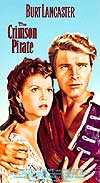 Early
in their careers, Burt Lancaster, Gregory Peck and Kirk Douglas were major
adventure heroes. Lancaster, a circus acrobat who was able to do his own stunts,
starred as Dardo the Arrow (a 12th century Robin Hood-like outlaw) who battled
an evil German count in the rousing, comic bookish tale The Flame and the
Arrow (1950). A young Burt Lancaster also starred as an 18th century buccaneer
captain in one of the best swashbucklers ever made - The Crimson Pirate
(1952). Gregory Peck appeared in Captain Horatio Hornblower (1951) as the famous British sea captain (replacing Errol Flynn who was originally
cast in the role) and naval hero of the Napoleonic wars. Early
in their careers, Burt Lancaster, Gregory Peck and Kirk Douglas were major
adventure heroes. Lancaster, a circus acrobat who was able to do his own stunts,
starred as Dardo the Arrow (a 12th century Robin Hood-like outlaw) who battled
an evil German count in the rousing, comic bookish tale The Flame and the
Arrow (1950). A young Burt Lancaster also starred as an 18th century buccaneer
captain in one of the best swashbucklers ever made - The Crimson Pirate
(1952). Gregory Peck appeared in Captain Horatio Hornblower (1951) as the famous British sea captain (replacing Errol Flynn who was originally
cast in the role) and naval hero of the Napoleonic wars.
And Kirk Douglas starred as a Viking with a deformed eye in
the rousing action-adventure epic The Vikings (1958), and he also played
the title role of Spartacus, the leader of a slave rebellion in Stanley Kubrick's
swords-and-sand epic Spartacus (1960), with screenwriting credits for
previously-blacklisted Dalton Trumbo.
Modern Day Swashbucklers - Pirate Films:
In the 80s and 90s, the pirate-themed film was unsuccessfully
revived again and again. Here are just some examples of modern-day pirate
adventure film that were usually box-office disasters and artistic flops:
- Michael Ritchie's Island (1980) - a modern-day,
bloody pirate tale with Michael Caine (as a reporter tracking modern day
pirates who terrorized vacationers), based upon Peter Benchley's novel,
with a score by Ennio Morricone
- Ken Annakin's The Pirate Movie (1982) aka The
Pirates of Penzance - a light-hearted, pop-rock musical romantic comedy
and lampoon, featuring a teenaged love story with Christopher Atkins and
Kristy McNichol
- The Pirates of Penzance (1983) - an adaptation of
Gilbert and Sullivan's comic operetta of the same name with two pop music
singers (Linda Ronstadt and Rex Smith) in the lead roles along with Kevin
Kline
- Yellowbeard (1983), Mel Damski's unfunny UK spoof
of pirate films, often noted as the final film for bug-eyed comedian Marty
Feldman
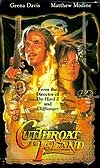 Stewart
Raffill's campy The Ice Pirates (1984), another parody/spoof of pirate
themes with additional science fiction elements, starring Robert Urich and
Anjelica Houston in a story of smugglers in a futuristic world where water
was a precious commodity Stewart
Raffill's campy The Ice Pirates (1984), another parody/spoof of pirate
themes with additional science fiction elements, starring Robert Urich and
Anjelica Houston in a story of smugglers in a futuristic world where water
was a precious commodity- Richard Donner's family-oriented (and financially-successful)
big-budget The Goonies (1985) (executive-produced by Steven Spielberg),
an adventure story with pirates and young stars as misfit kids (Sean Astin,
Josh Brolin, Corey Feldman and Martha Plimpton) searching for hidden treasure
in subterranean caverns bobby-trapped by a ghostly pirate (One-Eyed Willie)
- Roman Polanski's Pirates (1986) - with Walter Matthau
as Captain Red, the crusty head of a pirate ship
- Steven Spielberg's Hook (1991) - with Robin Williams
as an adult Peter Pan fighting Captain Hook (Dustin Hoffman)
- Renny Harlin's Cutthroat Island (1995) featuring
Geena Davis (Harlin's wife at the time) as a female swashbuckler was one
of Hollywood's most spectacular flops
- Muppet Treasure Island (1996) - with Kermit the
Frog, Miss Piggy and actor Tim Curry (as Long John Silver) in a comic retelling
of Robert Louis Stevenson's pirate novel
- Disney's animated sci-fi adventure tale Treasure Planet
(2002), a space-aged version of Stevenson's tale about a young boy and
a mutinous pirate named Silver
There was one major exception to the multiple financial disasters
- director Gore Verbinski's updated, thrilling and effective Pirates of
the Caribbean: The Curse of the Black Pearl (2003), with Oscar-nominated
Johnny Depp as tipsy, vilified scalawag Captain Jack Sparrow in a Disney-like
tale (and based upon a famous Disney theme park ride). It had all the elements
of classic pirate tales: a feisty damsel in distress (Keira Knightley), sea
battles and sword duels, cursed pirates (Geoffrey Rush as Captain Barbossa),
an heroic rescue, etc. The PG-13 rated film, with a Disney theme park-related
title, was the first Walt Disney Pictures film (usually a family-friendly
studio) ever to receive a MPAA rating over PG in the US. The film successfully
grossed over $650M worldwide, leading to two sequels to form a trilogy: Pirates
of the Caribbean: Dead Man's Chest (2006) and Pirates of the Caribbean:
At World’s End (2007).
Sea-Faring Adventure Films:
Water-related or sea-faring adventure films include Mutiny
on the Bounty (1935) (mentioned above), Walt Disney's production of
Jules Verne's adventure 20,000 Leagues Under the Sea (1954) - with
James Mason as Captain Nemo of the 19th century submarine Nautilus and a spectacular battle with a giant squid, and John Huston's re-telling
of Herman Melville's 1851 novel Moby Dick (1956) with Gregory Peck
as Captain Ahab searching for the elusive great white whale on the Pequod.
 Much
later, Steven Spielberg's blockbuster Much
later, Steven Spielberg's blockbuster  Jaws (1975) was based on Peter Benchley's book about a beach community
terrorized by a great white shark. James Cameron's fantasy-adventure, close-encounter
thriller The Abyss (1989) told about an underwater team of divers retrieving
nuclear warheads. The film adaptation of Tom Clancy's novel The Hunt for
Red October (1990) was about a threatening, high-tech Soviet nuclear submarine.
And similarly, Crimson Tide (1995), starring Denzel Washington (as
second in command Lt. Cmdr. Hunter) and Gene Hackman (as Capt. Ramsey), captured
the tense confrontations during an hour-long countdown (similar to the real-time
climax of Jaws (1975) was based on Peter Benchley's book about a beach community
terrorized by a great white shark. James Cameron's fantasy-adventure, close-encounter
thriller The Abyss (1989) told about an underwater team of divers retrieving
nuclear warheads. The film adaptation of Tom Clancy's novel The Hunt for
Red October (1990) was about a threatening, high-tech Soviet nuclear submarine.
And similarly, Crimson Tide (1995), starring Denzel Washington (as
second in command Lt. Cmdr. Hunter) and Gene Hackman (as Capt. Ramsey), captured
the tense confrontations during an hour-long countdown (similar to the real-time
climax of  High Noon (1952)) aboard the nuclear ballistic submarine USS Alabama after it received an interrupted transmission (similar to the plot of Fail-Safe (1964)). High Noon (1952)) aboard the nuclear ballistic submarine USS Alabama after it received an interrupted transmission (similar to the plot of Fail-Safe (1964)).
Jungle Adventure Films:
Other than the classic Tarzan pictures, other jungle adventures
included:
 the greatest jungle adventure film of all time, the Beauty and the Beast
classic the greatest jungle adventure film of all time, the Beauty and the Beast
classic  King Kong (1933) King Kong (1933)- Mogambo (1953) set in the Kenyan jungle - a remake
of Red Dust (1932) (set in Indo-China) that
reprised Clark Gable's role over two decades later - now modernized as an
African game hunter with co-stars Ava Gardner (a jaded American showgirl)
and Grace Kelly (a sophisticated, married, proper British lady) caught in
a love triangle
- director Howard Hawks' Hatari! (1962) with John
Wayne at the head of a group of E. African big game zoo-supplying hunters
- John Boorman's The Emerald Forest (1985) about a
young white boy kidnapped and raised by a primitive Amazonian tribe (the
Invisible People) in the Brazilian jungle
- director/actor Clint Eastwood's White Hunter, Black
Heart (1990) - a semi-fictionalized account of the filming of The
African Queen by director John Huston.
- director Werner Herzog's spectacular adventure film Aguirre, the Wrath of God (1972), a madly deluded and traitorous Spanish conquistador
(played by Klaus Kinski) led an expedition through the South American jungles
in a quest for the mythical lost city of gold - El Dorado
King Arthur and Knights of the Round Table Epics/Adventure
Films:
Many adventure epics have been based on the legend of King
Arthur, fulfilling the needs of Hollywood for films with heroes (and heroines),
a quest, and light vs. darkness. In some senses, the King Arthur films were
swashbucklers in disguise:
- the 15-chapter serial The Adventures of Sir Galahad
(1949) with George Reeves (in a pre-Superman role) in the title role
- based on Mark Twain's 1889 short story, Tay Garnett's time-travel
fantasy musical film with Bing Crosby, A Connecticut Yankee in King Arthur's
Court (1949) - other versions in 1921, 1931, 1970 (animated), and derivatives
including The Spaceman and King Arthur (1979) (aka The Unidentified
Flying Oddball and A Spaceman in King Arthur's Court), Michael
Gottlieb's children's fantasy A Kid in King Arthur's Court (1995),
and the adventure comedy Black Knight (2001) with Martin Lawrence
 Richard
Thorpe's romantic costume adventure epic Knights of the Round Table (1953) and MGM's first widescreen production in England, with Mel Ferrer
(as King Arthur), Robert Taylor (as Lancelot), and Ava Gardner (as Guinevere)
in the classic historical love triangle; the follow-up film for Robert Taylor
in Ivanhoe (1952); based on Sir Thomas Malory's classic 15th century
novel Le Morte D'Arthur Richard
Thorpe's romantic costume adventure epic Knights of the Round Table (1953) and MGM's first widescreen production in England, with Mel Ferrer
(as King Arthur), Robert Taylor (as Lancelot), and Ava Gardner (as Guinevere)
in the classic historical love triangle; the follow-up film for Robert Taylor
in Ivanhoe (1952); based on Sir Thomas Malory's classic 15th century
novel Le Morte D'Arthur- Tay Garnett's Arthurian 'western' and swashbuckler The
Black Knight (1954), with Alan Ladd as an aspiring young swordmaker
who became the vengeance-seeking Black Knight
- Henry Hathaway's CinemaScopic Prince Valiant (1954) with Robert Wagner as the title character and Janet Leigh as Princess Aleta,
with a story based on the Viking prince comic strip character from Hal Foster;
remade in 1997
- co-producer, star, and director Cornel
Wilde's Lancelot and Guinevere (1963) (aka Sword of Lancelot)
with Cornel Wilde as Sir Lancelot, Jean Wallace as Princess Guinevere, and
Brian Aherne as King Arthur
- Disney's animated The Sword in the Stone (1963),
based upon T. H. White's beloved novel, The Once and Future King
- Joshua Logan's big-budget musical Camelot (1967) with Richard Harris, Vanessa Redgrave, and Franco Nero replacing the original
Broadway stars of the Lerner-Loewe hit: Richard Burton, Julie Andrews, and
Robert Goulet; the film won Oscars for Costumes, Scoring, and Art Direction/Set
Decoration
- Stephen Weeks' historical fantasy adventure Gawain and
the Green Knight (1973, UK) featuring the coming-of-age story of a struggling
Sir Gawain, a young Knight of the Round Table
- Robert Bresson's spare and haunting Lancelot du Lac
(1974, Fr.)
- writer/director John Huston's old-fashioned, rousing costume
adventure film and morality tale told in flashback The
Man Who Would Be King (1975), based on Anglo-Indian novelist Rudyard Kipling's
(Christoper Plummer) short story tale, told about two roguish British soldiers-adventurers,
Peachy Carnehan (Michael Caine) and Daniel Dravot (Sean Connery) at the
turn of the century who were mistaken for gods or kings in the remote city
of Kafiristan in E. Afghanistan (a province now called Nuristan)
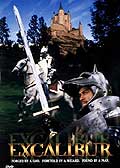 the
classic anarchic and irreverent spoof/parody Monty Python and the Holy
Grail (1975) with a series of mad sketches that skewered the legend
of King Arthur the
classic anarchic and irreverent spoof/parody Monty Python and the Holy
Grail (1975) with a series of mad sketches that skewered the legend
of King Arthur- Eric Rohmer's unique Perceval (1979, Fr.) - adapted
by the director from Chrétien de Troyes' unfinished Count of the
Grail, about the legendary chivalrous knight and one of the champions of
King Arthur's Round Table
- John Boorman's visually atmospheric and dark Excalibur
(1981) with Nigel Terry as Arthur and Nicol Williamson as Merlin, also
based on Le Morte D'Arthur; the original version was R-rated, then
re-released as a family-friendly PG-rated cut later
- Jerry Zucker's First Knight (1995) with Sean Connery
as King Arthur, Richard Gere as Sir Lancelot, and Julia Ormond as Guinevere
- Rob Cohen's sword and sorcery tale Dragonheart (1996) with Sean Connery as the voice of Draco (the dragon)
- Merlin (1998), a film made
from the original four-hour TV miniseries, retelling the classic tale from
the perspective of Merlin
- the feature-length animation Quest for Camelot (1998) from Warner Bros.
- Brian Helgeland's medieval adventure tale A Knight's
Tale (2001) - NOT based on King Arthur, but on Geoffrey Chaucer's The
Canterbury Tales
- Antoine Fuqua's historical costume adventure that 'reinvented'
or demystified the tale of King Arthur (2004) (from producer
Jerry Bruckheimer), with Clive Owen as Arthur, Ioan Gruffudd as Lancelot,
and Keira Knightley as a fierce, beautiful and courageous warrior-ess Guinevere
in some intense battle sequences
Films With Historical Explorers:
 Films
about historical explorers have incorporated adventure film characteristics: The Adventures of Marco Polo (1938) about the exploits of the 13th
century Venetian explorer with Gary Cooper in the title role, the search for
the long lost British explorer in Stanley and Livingstone (1939), Hudson's
Bay (1940), and the search for a legendary diamond treasure by Allan Quartermaine
(Cedric Hardwicke) and African King Umbopa (Paul Robeson) in E. Africa in King Solomon's Mines (1937) - based on Sir H. Rider Haggard's novel
(remade in 1950 and 1985). David Lean's epic biographical adventure
film and desert classic Films
about historical explorers have incorporated adventure film characteristics: The Adventures of Marco Polo (1938) about the exploits of the 13th
century Venetian explorer with Gary Cooper in the title role, the search for
the long lost British explorer in Stanley and Livingstone (1939), Hudson's
Bay (1940), and the search for a legendary diamond treasure by Allan Quartermaine
(Cedric Hardwicke) and African King Umbopa (Paul Robeson) in E. Africa in King Solomon's Mines (1937) - based on Sir H. Rider Haggard's novel
(remade in 1950 and 1985). David Lean's epic biographical adventure
film and desert classic  Lawrence of Arabia (1962) followed the exceptional exploits of
a British 'observer' in the Arabian desert during WWI, who led the Arab tribes
to victory over the Turks. Mountains of the Moon (1989) was about Victorian
explorer Sir Richard Burton's search for the source of the Nile in Africa. Lawrence of Arabia (1962) followed the exceptional exploits of
a British 'observer' in the Arabian desert during WWI, who led the Arab tribes
to victory over the Turks. Mountains of the Moon (1989) was about Victorian
explorer Sir Richard Burton's search for the source of the Nile in Africa.
Adventure Films in Outdoor and/or Foreign Locales:
Adventure films set in foreign or outdoor locales include:
 the film version of Jack London's story The Call of the Wild (1935) set in the Alaskan wilderness during the 1897 Klondike gold rush the film version of Jack London's story The Call of the Wild (1935) set in the Alaskan wilderness during the 1897 Klondike gold rush- director Tay Garnett's China Seas (1935), with Clark
Gable as a steamer captain with a cargo of gold bound for Singapore (from
Hong Kong) and a ship-load of MGM's stars, including sexy Jean Harlow, Wallace
Beery, Lewis Stone, and Rosalind Russell
- H. Rider Haggard's 1887 adventure novel made into a sound
film, She (1935), about explorers in the frozen Arctic who found
a living, eternal goddess - She-Who-Must-Be-Obeyed
- intrigue in Vichy-occupied Martinique in To
Have and Have Not (1944) with Humphrey Bogart and Lauren Bacall
- greedy prospecting for gold in the Mexico Sierra mountains
in the classic
 The Treasure of the Sierra Madre (1948) The Treasure of the Sierra Madre (1948)
- the shot-on-location African river adventure of
 The
African Queen (1951) featuring a boozing riverboat captain (Humphrey
Bogart) and his prissy boatmate (Katharine Hepburn) The
African Queen (1951) featuring a boozing riverboat captain (Humphrey
Bogart) and his prissy boatmate (Katharine Hepburn)
- director J. Lee Thompson's North West Frontier (1959) (aka Flame Over India) - set in turn-of-the-century India with Kenneth
More as a British Army officer who saves a group of fugitives (Herbert Lom,
Lauren Bacall) with an exciting train journey across colonial India
- the memorable Zulu (1964) - the true story of the
defense of an isolated mission station by a small number of British troops
(including Michael Caine) against 4,000 Zulu warriors in South Africa in
1879
- director/star Cornel Wilde's superior action-adventure The Naked Prey (1966), with Wilde as a safari guide who witnessed
the slaughter of his hunting party, and then was stripped naked and set
free to be chased/hunted by tribesmen
Other adventure films of this type include Ice Station
Zebra (1968) that featured a Cold War race toward a downed Russian satellite
between a US/British nuclear submarine under a polar ice cap and Soviet paratroopers,
the devastating weekend canoeing adventure of four Atlanta businessmen in Deliverance (1972), the climbing adventure K2: The Ultimate High (1992) as two men scale the world's 2nd largest
mountain in the world, an exciting climbing and hostage-rescue action film
starring Sylvester Stallone in Cliffhanger (1993), and Meryl Streep
leading a family river-rafting trip and criminals through dangerous rapids
in The River Wild (1994).
Charlton Heston: Adventure Hero
 Charlton Heston was also cast innumerable times as an adventure hero in epic
adventure films: first in two Biblical epics as Moses in Cecil B. De Mille's The Ten Commandments (1956), and as Palestinian
Jew Ben-Hur in William Wyler's Charlton Heston was also cast innumerable times as an adventure hero in epic
adventure films: first in two Biblical epics as Moses in Cecil B. De Mille's The Ten Commandments (1956), and as Palestinian
Jew Ben-Hur in William Wyler's  Ben-Hur (1959). Heston was also cast as the
legendary 11th century Christian hero Rodrigo Diaz de Bivar in El Cid (1961),
and as an astronaut crash-landed on a planet ruled by apes in the science-fiction
adventure film Planet of the Apes (1968). Ben-Hur (1959). Heston was also cast as the
legendary 11th century Christian hero Rodrigo Diaz de Bivar in El Cid (1961),
and as an astronaut crash-landed on a planet ruled by apes in the science-fiction
adventure film Planet of the Apes (1968).
Foreign Language Adventure Films:
The French film by director Henri-Georges Clouzot titled Wages
of Fear (1953) was an adventure thriller about four desperate Central
American small-town residents who accepted a suicidal mission to drive highly
volatile nitroglycerine to a destination three hundred miles away, to put
out raging oil-well fires. Writer/director Akira Kurosawa's great masterpiece The Seven Samurai (1954) was set in 16th century Japan, where the residents
of a small farming village sought protection against repeated attacks by marauding
bandits through the hiring of seven professional swordsmen.
Aviation-Related Adventure Films:
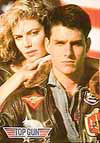 Aviation-related
adventure films include: director Howard Hawks' Only
Angels Have Wings (1939) with Cary Grant as the head pilot of a broken-down
Peruvian air mail service, John Wayne as an ace fighter pilot flying against
the Japanese before the US entered the war in the low-budget Flying Tigers
(1942), Billy Wilder's The Spirit of St. Louis (1957) with James
Stewart as the famous solo flyer Charles Lindbergh, Robert Aldrich's survival-adventure
drama The Flight of the Phoenix (1965) about a North African desert
plane crash with a plane full of stars, and Top Gun (1986) with Tom
Cruise as one of the young competitive Navy fighter pilots in the elite Fighter
Weapons School. The suspenseful Apollo 13 (1995) chronicled NASA's
crisis-filled lunar mission in 1970. Aviation-related
adventure films include: director Howard Hawks' Only
Angels Have Wings (1939) with Cary Grant as the head pilot of a broken-down
Peruvian air mail service, John Wayne as an ace fighter pilot flying against
the Japanese before the US entered the war in the low-budget Flying Tigers
(1942), Billy Wilder's The Spirit of St. Louis (1957) with James
Stewart as the famous solo flyer Charles Lindbergh, Robert Aldrich's survival-adventure
drama The Flight of the Phoenix (1965) about a North African desert
plane crash with a plane full of stars, and Top Gun (1986) with Tom
Cruise as one of the young competitive Navy fighter pilots in the elite Fighter
Weapons School. The suspenseful Apollo 13 (1995) chronicled NASA's
crisis-filled lunar mission in 1970.
|
